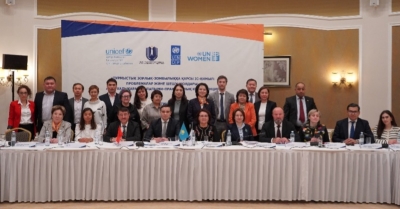Bangladesh marks UNESCO International Mother Language Day
The discussion, which took place in the Brussels press club, also showed a short documentary about the core role that language played in the independence movement of Bangladesh.
The initiative to introduce an International Mother Language Day was led by Bangladesh and unanimously approved by the General Conference of UNESCO in November 1999. The UN General Assembly also welcomed the proclamation of the day in a resolution of 2002.
Oriol Freixa Matalonga, from the Brussels UNESCO Liaison Office spoke about the importance UNESCO attaches to multilingual education and the growing understanding that it is not just about cultural inclusivity, but also ensuring that no child is left behind. This is especially important in early learning where a child can start his or her education in the language they are most familiar with. UNESCO has worked with all countries to advance this objective, it has supported the translation of more than 300 children’s books into Bangla, to encourage literacy.
21 February was chosen because it was on this day in 1952 when student protestors, activists and the people of Bangladesh (then East Pakistan) laid down their lives for establishing the right to use their mother tongue, Bangla, which paved the way for the long struggle for freedom of the Bengalis led by Father of the Nation Bangabandhu Sheikh Mujibur Rahman, culminating in a liberation movement that led to the independence of Bangladesh in 1971
“On this very day, our forefathers laid down their lives to establish our mother tongue Bangla as a state language,” says the Bangladesh Ambassador to the EU Mahbub Hassan Saleh. “Pakistan wanted to impose Urdu as the only state language, even though Bengali or Bangla was spoken by the majority of the population. If you look at our history, our struggle for independence is actually rooted in that language movement, so this is an extremely important day in the history of Bangladesh.”
Over the decades, the language movement of Bangladesh has garnered international attention, Hříbek, who is a philologist and ethnologist who speaks fluent Bengali and teaches at the Institute of Asian Studies, in the prestigious Charles University in Prague, says there are many lessons that can be taken from Bangladesh’s language movement: “The most important lesson is that no matter how forcefully a government of a particular state wants to impose another language on the community there is always a backlash. To promote a linguistically inclusive society is definitely an important lesson that we can take from the population language movement. Another one, is the importance of student movements in transformative changes. So, the student movement for the Bengali language can be seen in one way also as an antecedent of the contemporary climate strikes of students around the world.”
AdvertisementThe short documentary told the story of the language martyrs, killed when demonstrating to establish their language rights. It featured a song penned by Abdul Gaffar Chowdhury, to mark their struggle: ‘Amar Bhaier Rokte Rangano Ekushey February’. In the documentary the song is translated into more than twelve languages. It is still one of the most popular songs in Bangladesh today.
The event was also attended by European External Action Service (EEAS) former ambassador to Bangladesh Rensje Teerink. Teerink is now EEAS’s Deputy Director with responsibility for the Asia Pacific area. The European Economic Community established diplomatic relations with the then recently established independent state of Bangladesh in 1973. The EEAS wants to mark the golden anniversary of EU-Bangladesh relations by further deepening cooperation and formal relations with Bangladesh.
The Embassy and EEAS will be working together on a number of cultural projects to mark the year. Ambassador Hassan Saleh said: “We are planning a number of events, including high level visits, from both sides. We are also planning to have a painting exhibition, as well as music and dance performances. We will also promote the homegrown fashion of Bangladesh. There are lots of ideas, but we want to give our collaboration with the EU a very concrete shape through our conversation and collaboration with our friends in the European External Action Service and other EU institutions. This is a very, very important and significant year for Bangladesh and EU partnership.”
Share this article:



